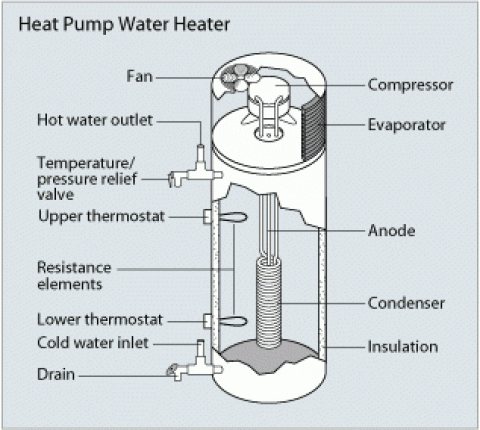San Diego Heat Pump Water Heaters
Do you need a new water heater in San Diego? If so, consider getting a heat pump water heater installed instead. Heat pumps are used by the majority of homeowners to heat and cool their houses. However, a

Heat Pump Water Heater
heat pump can also be used to heat water, either as a standalone system or as part of a combined water heating and air conditioning system.
How They Operate
Instead of generating heat directly, heat pump water heaters use energy to transport heat from one location to another. As a result, they can save two to three times as much energy as traditional electric resistance water heaters. Heat pumps act like a refrigerator in reverse to transport heat.
A stand-alone air-source heat pump water heater draws heat from the surrounding air and transfers it — at a higher temperature — to heat water in a storage tank, similar to how a refrigerator pulls heat from inside a box and delivers it into the surrounding room. A stand-alone heat pump water heating system with a built-in water storage tank and backup resistance heating elements is available as an integrated unit. A heat pump can also be retrofitted to work with an existing traditional storage water heater.
Heat pump water heaters must be installed at temperatures ranging from 40°F to 90°F (4.4°C to 32.2°C) all year and must have at least 1,000 cubic feet (28.3 cubic meters) of air space around them. The air that passes through the evaporator can be vented either into the room or outside.
Heat pump water heaters are inefficient in cold environments because they cool the space they are in. Installing them in an area with a lot of heat, such as a furnace room, will help them work more efficiently.
An air-source heat pump system that combines heating, cooling, and water heating can also be installed. In the winter, these combination systems pull heat from the outside air, while in the summer, they pull heat from the inside air. In a hot region, any sort of air-source heat pump system works more efficiently since it removes heat from the air.
Homeowners generally use geothermal heat pumps to heat and cool their houses, which extract heat from the ground in the winter and from the indoor air in the summer. A desuperheater can be added to a geothermal heat pump system for water heating. A desuperheater is a tiny heat exchanger that heats water using superheated gases from the heat pump’s compressor. The hot water is then routed through a pipe to the house’s storage water heater tank.
For tankless or demand-type water heaters, desuperheaters are also available. The desuperheater uses the extra heat that would otherwise be ejected to the ground in the summer. The geothermal heat pump may be able to provide the majority of your hot water needs if it is used frequently throughout the summer.
When the super heater isn’t producing as much excess heat in the fall, winter, and spring, you’ll need to rely more on your storage or demand water heater. Triple-function geothermal heat pump systems, which provide heating, cooling, and hot water, are also available from some manufacturers. To supply all of a household’s hot water needs, they use a separate heat exchanger.
How to Choose a Heat Pump Heater for Water
The starting prices of heat pump water heaters are often higher than those of traditional storage water heaters. They do, however, have reduced running costs, which can compensate for the greater purchase and installation costs.
You should also think about the following things before purchasing a heat pump water heating system:
-Size and rating for the first hour -Fuel kind and availability
-Overall expenses -Energy efficiency (energy factor)
See our information on air-source heat pumps and geothermal heat pumps if you’re thinking about installing an integrated water heating, space heating, and cooling heat pump system in your house.
Maintenance and Installation
Your heat pump water heating system’s energy efficiency can be improved with proper installation and maintenance.
Many factors influence proper installation. Fuel type, environment, local construction code requirements, and safety concerns are among these considerations. As a result, it’s recommended to have your heat pump installed by a licensed plumbing and heating contractor (or a geothermal heat pump system installer/designer).
When looking for a qualified specialist, keep the following in mind:
-Ask for written cost estimates
-Ask for references
-Check the company with your local Better Business Bureau
-Confirm that the company will seek a local permit if necessary and is familiar with local building codes.
Periodic water heater maintenance can considerably extend the life of your water heater and reduce efficiency loss. Specific maintenance advice can be found in your owner’s manual.
Increasing the effectiveness of energy use
Try some additional energy-saving methods to assist lower your water heating bills after your water heater has been properly built and maintained. Installing some energy-saving gadgets and systems with the water heater is more cost-effective.
Source: https://www.energy.gov/energysaver/heat-pump-water-heaters


